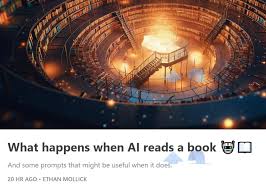May 26th, 2023
I’m borrowing this title from another newsletter deliberately — there’s no need to try to improve on it. It gives me a chance to alert my readers to the person who I think is the finest commentator on practical AI — Ethan Mollick, a professor at the Wharton School of the University of Pennsylvania, who studies entrepreneurship & innovation. His (free, but please contribute) newsletter is calm, refreshing, and uniquely insightful.

Among the things that qualify Mollick as a commentator is that he has no skin in the game. He doesn’t need to sell AI, nor to trash it. He has merely committed to exploring AI in its many impacts, mostly upon education, culture, writing, and publishing. And he’s a fine, clear writer. He has helped me greatly to understand the current generation of AI technology.
If you browse through Mollick’s newsletter archives you’ll see that he didn’t begin to focus on AI until last December. It wasn’t his beat — like most of us, AI dropped in on his day job, and he couldn’t take his eyes off it.
His latest (periodic, but frequent) newsletter, just published, falls closest to our interest as publishing professionals. “Might AI,” he asks, “change the way we interact with books?”
I think that we are each asking ourselves the same question.
To undertake the test, Mollick notes, “we need both an AI with a memory large enough to hold a book, and an author who knows their own book well enough to judge the AI’s results.” Mollick tests one of his several titles (he doesn’t specify which one, but from the chats it’s clearly The Unicorn’s Shadow: Combating the Dangerous Myths that Hold Back Startups, Founders, and Investors, a book very favorably reviewed on Amazon, though not a current bestseller).
Mollick looks at different aspects of AI’s potential value to an author, publisher or reader, including “AI as reader and editor,” and “a practical use: help for instructors.” He asks an LLM — large language model — not ChatGPT — to summarize the book. It succeeds to Mollick’s satisfaction.
Then a tougher challenge: “Give me examples of metaphors in the book.” Metaphor, he points out, “is challenging for even human readers, as it involves finding a use of figurative language without any clear markers (unlike a simile, there are no “likes” or “as”).” The results, he records, “are impressive, though there are minor errors.”
The LLM is less successful as an editor: it’s failings in this department, Mollick notes, illustrate “something that has become clear about the current state of AI: if you are a very good writer or editor, you are better than current AI…”
Nonetheless, “AIs have, or at least have the appearance of having, an understanding of the context and meaning of a piece of text.” As a result, Mollick believes that “how we relate to books is likely to change as a result of AI.”
I think so too.
Read his post here. Check out the archive as well.